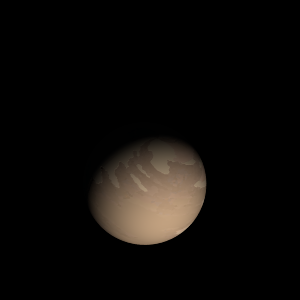|
|
Space Astro
|
Info for exoplanet "Carkal-eudome"
| Scientific (actual) data |
|---|
| Name | K2-75 c |
| Planet status | Confirmed |
| Radius | 0.247 |
| Orbital period | 18.311 |
| Semi major axis | 0.1429 |
| Discovered | 2016 |
| Updated | 2021-02-05 |
| Tconj | 2456990 |
| Publication | Published in a refereed paper |
| Detection type | Primary Transit |
| Alternate names | EPIC 206348688.02 |
| Star name | K2-75 |
| Right ascension | 338.85° |
| Declination | -7.47° |
| Mag j | 11.564 |
| Mag h | 11.283 |
| Star distance | 570.86 |
| Star mass | 1.16 |
| Star radius | 1.56 |
| Star temperature | 5995 |
| Star alternate names | 2MASS J22352275-0728114, EPIC 206348688, WISE J223522.76-072811.5 |
| Wikipedia article | K2-75 c |
Back
| |
| Fictional info (?) |
|---|
| Suggested name | Carkal-eudome |
| Planet type | Terrestrial |
| As seen relative to the fixed stars, it rotates on its axis exactly three times for every three revolutions it makes around K2-75.
The atmospheric pressure at the planet's surface is 6 bar, or roughly the pressure found 990 m under the oceans of Earth.
It was the one of the first exoplanets visited by a spacecraft, and one of the first to be successfully landed on.
Its north and south poles, therefore, lie where most other planets have their equators. |
| Atmosphere | Hydrogen chloride | 96% |
| 2H2O | 1.5% |
| Helium | 1.5% |
| Hydrogen peroxide | 0.3% |
| Nitric oxide | 0.15% |
| Xenon | 0.0022% |
| Atmospheric pressure | 6 bar |
 |
| No known satellites |
| Google search for Carkal-eudome |
|
Website by Joachim Michaelis
|
|
|
|